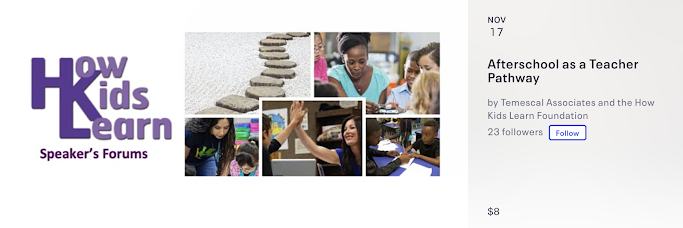By Sam Piha
 |
| Source: A Natural Fit: Supporting After-School Staff of Color in Teacher Pipelines |
In a previous blog post, we wrote about the importance of afterschool programs representing a pathway to teaching. You can read the previous blog here. We encourage that afterschool leaders discuss this option/ pathway with their afterschool staff.
Below we share quotes from afterschool workers who advanced their career by becoming teachers. These quotes are from an important publication from The Education Trust entitled, A Natural Fit: Supporting After-School Staff of Color in Teacher Pipelines. (On a personal note, my career began with work in afterschool programs followed by 10 years of classroom teaching.)
“Even though we were an after-school program, part of the staff was there during the school day, too. So, we did things similar to what a student teacher would do to support daytime teachers in their classrooms. Seeing what teachers did, and taking that knowledge and experience and trying to implement it in the after-school portion of it, made me feel like I could be a teacher, too.”
“The after-school program let me exert all kinds of my potential. It also brought out my true character of wanting to serve and help people — especially kids and people of the community.”
“[The after-school/OST experience] just made [becoming a teacher] more concrete for me that I wanted to work in my own community, or communities of color.”
“It was different because I had that experience of connecting with students, especially students from different backgrounds. My other colleagues who didn’t really have experience had a harder time being able to teach the students because they couldn’t make that connection.”
“It prepared me to work with parents, because as an after-school counselor, we had to connect with families and speak to and communicate with them very often.”
 |
| Source: www.collegescholarships.org |
“We had groups of students, we had lesson plans, unit plans, curricula, we had to internalize it. There was professional development on teacher voice, teacher presence, warm-strict, classroom management. We weren’t trained as though we were after-school babysitters. We were trained like we were teachers.“
“It’s made me think about struggles that the students might face. In the after-school program, I’ve noticed a lot of students who are always hungry, or stuff like that. It’s influenced me to have snacks inside my classroom or to be more understanding of why a certain child is acting a certain way, because there are other outside factors that might be involved.”
“I absolutely loved building those relationships [in after-school/OST work], having those moments when students came to me to talk about things that were college-related or things that didn’t relate to school at all. Just having someone to relate to because I was someone like them.”
“[The after-school/OST workers] know the students because they grew up in the same neighborhoods. They know the same police officers. They know the corner stores, they know the supermarkets, they know the libraries, they know what students have access to and what they don’t. So as far as connecting with the actual students, the families, the parents, they thrive. Because it’s one thing to know the school, but to also know your community.”





No comments:
Post a Comment